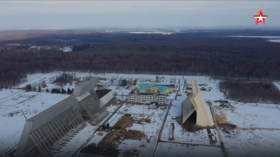Moscow’s missile defenses beefed up

The Russian military is set to complete an overhaul of Moscow’s air and missile defense systems this year, Defense Minister Sergey Shoigu has reported. The Russian capital was fortified against a possible nuclear strike during the Soviet era.
Speaking on Wednesday at a ministerial meeting on military procurement, Shoigu detailed that the upgrade will involve a change in the composition of the forces tasked with protecting the city, including the formation of a new regiment armed with S-350 Vityaz medium-range anti-missile systems.
The defense minister added that the ‘Razvyazka’ system would be put into service, referring to the decade-long modernization program of a ground radar station in Moscow Region, which serves as an element of Russia’s military space control architecture.
The upgraded facility has a 15-by-100-meter transmitting antenna and a 50-by-100-meter receiving antenna located several kilometers apart. It specializes in tracking small spacecraft, such as CubeSat satellites, and was designed by a subsidiary of defense manufacturer Almaz-Antey. Military experts believe that it also provides targeting information for advanced Russian anti-satellite and anti-ballistic missile systems.
The Soviet leadership chose Moscow as the location it would defend from a possible nuclear strike when it signed the Anti-Ballistic Missile (ABM) Treaty with the US in 1972. The document barred both nations from deploying ABM systems, viewing them as degrading US and Soviet nuclear deterrence, but allowed a single exception for each party.
US President George W Bush withdrew from the agreement in 2002, claiming that his country needed a national ABM system to defend against Iran and North Korea, which Washington branded “rogue nations.”
Moscow has described that move as the first step in Washington’s long policy of dismantling the strategic military balance, compromising Russian national security interests in the process.












